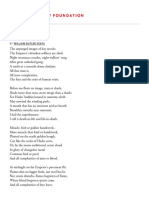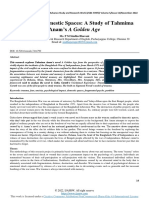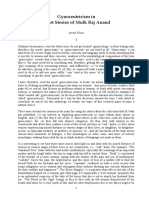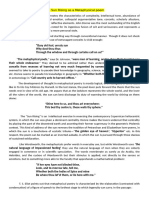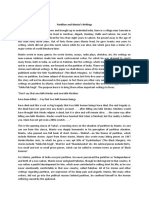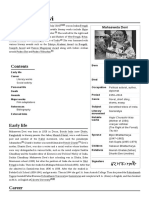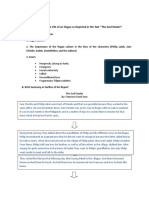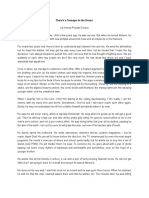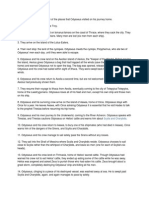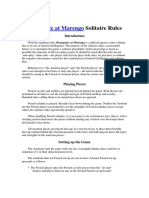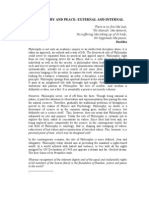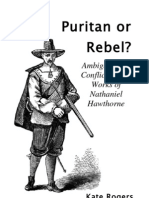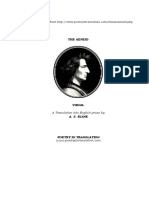Introduction To Roman Comedy
Introduction To Roman Comedy
Uploaded by
aintenoughCopyright:
Available Formats
Introduction To Roman Comedy
Introduction To Roman Comedy
Uploaded by
aintenoughOriginal Title
Copyright
Available Formats
Share this document
Did you find this document useful?
Is this content inappropriate?
Copyright:
Available Formats
Introduction To Roman Comedy
Introduction To Roman Comedy
Uploaded by
aintenoughCopyright:
Available Formats
Introduction: Early Roman Literary Drama (derived from the Greeks) The turning point in Roman drama came
in 240 BCE, when a Greek-speaking slave living in Rome, Livius Andronicus, translated Homer's Odyssey into Latin. As it turned out, this was a watershed experience that inaugurated the Romans into a century-long fascination with Hellenic culture. In more ways than one, that moment in history constitutes the inception of Latin literature. But who was this Livius Andronicus and why were his adaptations of Greek literature so significant in the evolution of Roman civilization? A freed slave, we are told, Livius Andronicus served in the house of the Livii, a noble family of Rome, from whom he took his name. As such, he probably came to Rome when he was still a child and, no doubt, grew up bilingual, putting him in an excellent position to bridge Greek and Latin civilization. Besides The Odyssey, his adaptations included several Greek tragedies, mostly from originals by Sophocles and Euripides (Ajax, Andromeda, Danae, Tereus), and also comedies adapted from unknown sources (Gladiolus, Ludius). It's a fair question to ask why he did not write his own original works indeed, the same could be posed for every Roman playwright whose works survive and the answer must be that he considered it wasted effort to till a field when the world doled out free grain. In other words, why make a play when you can steal one? It was an age when copyright did not yet exist and it was considered neither illegal nor immoral, or even inadvisable, to adapt another's work. A more compelling question concerning the originality of Roman drama revolves around why the Roman public sought out Greek drama so avidly. The answer to that riddle lies, no doubt, in the nature of Greek drama itself. The complex but coherent plots of Greek tragedy and comedy had no parallel in this age. For much the same reason, the cinema of a few nations today commands most of the world's attention and, like Greek drama in antiquity, has attracted a large viewership outside its native land. But plays written for the amusement of Athenians did not necessarily carry over to other countries and cultures wholesale. Filled as Greek comedies were with local references and all sorts of Hellenisms, many of them proved incomprehensible, and occasionally reprehensible, to other peoples. Thus, these plays had to undergo more than translation to make them workable in other venues. They had to be adapted, and in the process Roman playwrights re-conceived Greek drama, whether they intended to or not odds are they did creating along the way some of the most effective multicultural efforts ever produced on the stage. That Roman Comedy has survived across time to our day is really no surprise, then. It was, by definition and from the very outset, a multicultural form of drama designed to blend different social contexts, in a way the Greek originals on which it was based were not. Thus, Plautus' work has appeared on the modern Broadway stage most recently in A Funny Thing Happened on the Way to the Forum, a musical adapted from his plays where Menander's plays for all their subtle virtues, brilliant characterization and prescient humanity never have. An increasing demand for drama after 240 BCE opened the way for new opportunities to present drama in Rome. Livius Andronicus had premiered his work at the central Roman festival, the Ludi Romani ("the Roman games"), but soon other festivals joined the theatre fray: the ludi Plebeii ("the Plebeians' games"), the ludi Apolinares (those in honor of Apollo), theludi Megalenses (in honor of the Asian goddess Cybele), and others. The funerals of important Romans also offered opportunities for Rome's best families to make a show of public benefaction in the form of sponsoring free entertainment for all. Thus, many doors in and around the city opened to drama, encouraging prospective playwright-adapters. Among the first and most successful of those early Latin dramatists was Gnaeus Naevius whose career spanned several decades (ca. 235-204 BCE). A native Roman and a citizen, he adapted Greek tragedies, mostly Euripides' (Hector, Iphigenia, The Trojan Horse), and also comedies, especially Menander's (Kolax), blending with great skill Hellenic and native Italian elements to suit his audience's taste. If not the originator of Roman drama, he was, without doubt, its first major star. Naevius is remembered for several bold developments, for instance, having his "Greek" characters make obvious references to current Italian life, even using the stage at times as a soapbox for airing the playwright's views on contemporary politics and society. Short of a parabasis but not by much! these moments earned him many important enemies and later sources recall his entanglements with powerful Romans, one of which is said to have landed him in jail. Unfortunately, very little of his work survives so we cannot judge any of this for ourselves, but in terms of theatre history, it is clear that Naevius played an important role in accelerating the "Romanization" of Greek drama, a path that would lead eventually to a new and original genre of literature. While others composed and produced comedies in this incipient phase of "literary drama" among them the important early Roman poet Ennius they all pale by comparison to the first truly great theatrical voice of Rome, Plautus, who is pre-eminent in many ways: he is the earliest Roman dramatist whose work survives whole; he is, in fact, the earliest Roman author in any genre who has a work preserved entire; and he is the first known professional playwright in Western Civilization. That is, he's the first theatre practitioner we know of whose next play and next meal were intimately connected, what would become an enduring tradition carried on by the likes of Shakespeare, Molire and O'Neill. His "professional" status shows in his sturdy, practicable comedy, drama which has clearly been tested and proven on the Roman stage and, from there, virtually every type of performance space imaginable. Indeed, it takes a real gift to make Plautus' comedy not work on the stage. II. Plautus (ca. 254-184 BCE) The full name, or so we are told, of the Roman playwright popularly known as Plautus is Titus Maccius Plautus, but there is much to make us suspect this was not his real name. For one, his own plays never refer to him by this three-word name, only parts of it: Titus Maccius, Maccus, or just Plautus. For another, this sort of tripartite name was a way of denoting Roman aristocrats, wherein each part of the name designated particular information the first name (praenomen) was the name given a nobleman within his immediate family, the second name (nomen) denoted his gens or the larger family group he belonged to, and the third his clan or branch within that gens but it is highly unlikely Plautus was born into the upper classes, at least, to judge from his dramas and what little we are told about his life. (note) Why, then, does he come down to us with such a noble-sounding name? Plautus' names themselves are odd there is, for instance, no known Maccius clan of the Plautus family instead, all three appear to be jokes mocking this complex, aristocratic nomenclature. To wit, Titus is slang in Latin for "penis," Maccius can be translated as "son of Maccus (the clown of Atellan farce)" and Plautus has a number of possible associations, most likely of which is "flat-footed" referring to a type of mime actor. Thus, the name says in Roman terms, "Titus belonging to the Flatfoot clan of the Maccus family" or, expressed in modern equivalents, "Dick Bozo Flatfoot." Thus, it seems safe to say this was not the playwright's birth-name but a stage name made up for comic purposes. And it conforms with other data ascertainable about Plautus from his drama: his taste for puns and broad comedy, his love of song and dance, his mockery of the upper classes and his strong ties to Atellan farce. Even if this humorous designation does not stem from Plautus himself, someone who knew his work intimately concocted it, which makes it as good as true. What little else we are told about Plautus' life is probably later fabrication. That he was supposedly a freed slave who lost several fortunes and had to work in the mills is, no doubt, biographical detail invented out of his own comedies where slaves often win and lose large sums of money and fear the threat of being sent to labor camps. This fiction closely resembles the false information we receive about Euripides that his home life was as troubled as that of his characters just another tabloid tale abstracted at some later date from the playwright's drama in the absence of valid historical data. About the only fact we can be certain of concerning Plautus the person is that he was a highly successful, comic playwright in late third-century and early second-century Rome. And because, as noted above, Plautus is also the first Roman author belonging to any genre whose work survives entire, he is a valuable source of not just theatre history, but also the linguistic and cultural history of Rome. This sort of primogeniture, no doubt, played a large role in the later preservation of his comedy which grammarians valued for its use of peculiar and archaic Latin vocabulary, just as much as Roman audiences loved Plautus' rollicking, lively humor. In this respect as well as his earthy humor, he resembles Aristophanes more than Menander or any of the New Comedy poets whose plays he hammered into Latin. A. Plautine Comedy
Plautus' comedies revolve mostly around daily life and average people, superficially the stuff of Greek New Comedy as opposed to the politically oriented Old Comedy of the Classical Age or the spoofs of tragedy popular in post-classical Middle Comedy. Plautus, however, generates humor in a different way from Menandrean comedy. Often extreme personality types set in outlandish situations, Plautine characters as a group recall Aristophanes' creations more than Menander's. Indeed, devious pimps, mercenary prostitutes, lustful young men, lustful old men, tortured mothers and torturing wives and, most of all, crafty slaves who delight in deception populate Plautus' plays. This feast of broad stock types is a far cry from Menander's subtly shaded characters, and in a way, Plautus's comedy rewinds the evolutionary clock and returns Menander's characters to the caricatures from which they arose. Lest, however, this be seen as some sort of step backwards toward more "primitive" comedy, he did it all to excellent effect. Plautus's sense of comic timing, exactly how far to take a joke or run a scene, is unsurpassed in Western drama, even by Shakespeare, all of which presupposes a shrewd understanding of his audience's needs, intelligence and the reason they are sitting in the theatre at all. As a result, Plautus' plays may not always be great art, nor do they strive at every moment to educate or improve the audience or advance the technology of theatre, but Plautus' comedies are invariably and without exception entertaining. To the extent, then, that effective comic drama entails art or education or technological advancement, Plautus can be all those things, so long as the final product works on stage and people will pay to see it. The fact is, his comedies continue to be performed with great success today they were among the first ancient plays produced on stage in the Renaissance, the dawn of the modern age and even such crusty curmudgeons as the Christian fathers saw worth in his drama. St. Jerome, in particular, seems to have been quite fond of Plautus, at least to judge from how often he quotes Plautine comedy, all of which attests to the Roman's astute and practical assessment of what a general viewership seeks from comic drama: wit and diversion, spiced with sage observation of human life. Indeed, what audiences really want is a paradox, a stark enigma Plautus understood as well as anyone ever has. While many viewers announce in public that they want to learn from plays or see goodness and morality triumph, all too often what they actually pay for are flashy, vapid, sensual, amoral spectacles. At the same time, if there is nothing to be gained intellectually or esthetically from a play, their attention quickly turns to fresher, slicker, more novel nonsense and they tend not to come back a second time or send their friends who own wallets. Plautus' drama shows that he understood this conundrum quite well, and his finest talent is, no doubt, his ability to walk the fine line between fine art and a fine time. This raises, then, a question that lies at the very heart of studies in Roman Comedy: how did Plautus create theatre so effective in such a place and time? While his cultural situation may look like a disadvantage especially in comparison to the erudite and drama-mad society that for centuries packed the Theatre of Dionysus in Athens there is much to say that Plautus' Rome was actually a fertile field for his art. The absence, for instance, of a commanding native tradition of theatre in late third-century Rome gave him carte blanche to create plays in a manner that suited his talent. He could follow his instincts and write with a freedom Menander never had nor even Euripides, with a liberty, in fact, no Greek playwright had ever had, not at least since Aeschylus' day. Furthermore, he had an eager audience ready to explore the stage and vast dramatic wealth to draw upon. Far from a poor "niche" for theatre, when seen this way, the Roman world of Plautus' day had everything going for it. He could pull what he wanted from Atellan farce, with which he was clearly familiar, to judge from his stage-name he may even have been trained as a performer in that genre what's more, he could siphon off ideas at will from the great, untapped reservoir of Greek comic drama. From one perspective, his plays represent an inspired blend of native Italian drama and Hellenistic comedy, the product of lathering a bawdy slapstick tone over the well-oiled machinery of Menander. To have seen and utilized the opportunities for making effective comedy in such a situation, that is surely Plautus' finest stroke of genius. Titus Maccius Plautus,"PLAUTUS," the single name by which modern writers refer to this writer of Roman comedy, was merely a nickname which in exact Umbrian dialect meant "flatfoot." It is exactly as though, today, we were to say, "John Jones, Beanpole." It is doubtful whether Plautus ever achieved Roman citizenship. He is supposed to have made money working around the Roman stages as carpenter or mechanic; to have set himself up in some sort of business where he promptly lost his entire savings; finally to have been reduced to turning a handmill for a baker. It is during this period, according to tradition, that he probably sold his first plays to the managers of the public games and thus began the playwriting career that lasted for nearly forty years. The plays of Plautus, as was the custom, had Greek characters, Greek names, and Greek scenery, but the manners and flavor were distinctly Roman. Most of his plots Plautus adopted whole from Greek originals of the "New Comedy" period. If we find the comedies of Plautus unspeakably vulgar in conception and expression we must remember that he had to appeal to an uneducated crowd whose chief interests were in bear baiting and gladiatorial combats. If Plautus was to eat, his humor had to be broad or his plays would have been shouted off the stage. Menaechmi, or The Twin Brothers, is probably the best known of the Plautian comedies because it was translated into English at an earlier date than others of his works. It is from this play that Shakespeare took the plot for his Comedy of Errors. From the Plautian comedy, Miles Gloriosus (The Braggart Soldier) the swaggering soldier type of the Renaissance was born while from Amphitruo later under Molire's skillful touch came a popular French comedy. Nicholas Udall's Ralph Roister Doister also owes its life to Miles Gloriosus as does Shakespeare's eternal Falstaff. Jonson's The Case Is Altered is a skillful amalgamation of Aulularia and Captivi. Dryden, Addison, and the GermanLessing also profited from the plots and characters of Plautus. The works of Plautus do not show the insight nor delicacy of Terence, but they posses undoubted life and vigor. His originality showed itself in his attempts to set whole scenes to music. His perfect command and skillful use of the Latin language gained for him the favor of the more cultured Romans, just as his swift-moving plots and humorous situations attracted the uneducated classes. Aulus Gellius (c.A.D. 150) tells us a little about the life of Plautus. He was born in Sarsina, a small Umbrian town in the mountainous area northeast of Rome, perhaps in 254 B.C. He made money in operis artificium scaenicorum. This probably means he was a "stage-hand." He then lost his money in an overseas shipping investment and was put in jail for debt. In jail he was made grind flour with a device called a trusatiles. In prison he reportedly wrote plays, the "Bondsman" (Addictus) and "Fatso" (Saturio) among them. From this we gather that he was able to pay off his debt and begin a successful career as a playwright. Plautus lived and wrote during and immediately after the Second Punic. He died during the censorship of Cato the Elder, in 184 B.C. THE MENAECHMI A synopsis of the play by Plautus Almost identical twins were born to a merchant of Syracuse, in Sicily, and were named Menaechmus and Sosicles. Several years later, Menaechmus was stolen and carried off to the city of Epidamnus. The grieving grandfather, in his affection for the lost boy, gave his name to Sosicles. When the twins are grown to manhood, Menaechmus of Syracuse sets out in search of his brother. He arrives in Epidamnus, unaware that his twin brother is there also. Here, the brother is first shown to be, with good cause, the despair of his jealous wife. He is seen leaving his house, berating his spouse as a shrew and a harpy, promising that she shall have good cause for her jealousy. He confides to Whiskbroom, a professional parasite, that he has stolen his wife's mantle and is going to give it to Erotium, a prostitute who lives next door. The two go to Erotium's door, and the husband presents the mantle with many blandishments. He suggests that a fitting return would include a dinner for himself and Whiskbroom. Erotium agrees, and the two men go to the Forum for preliminary drinks while the meal is being prepared. Meanwhile, the twin from Syracuse has arrived with Messenio, his slave. The latter warns him of the depravity of Epidamnus, urging an end to the search for his missing brother since their money is nearly gone. His master gives his purse for safekeeping to the slave who continues his warning against the cunning people of Epidamnus "who think nothing of accosting a stranger" and bilking him of his money, when Erotium steps out of her
house and endearingly accosts the Syracuse Menaechmus, thinking him to be his brother. She asks why he hesitates to enter when dinner is ready, and the confused twin asks her, quite formally, what business he has with her. Why, the business of Venus, Erotium replies coyly. Messenio whispers to his master that the lady undoubtedly is a schemer for his money, and asks her if she knows his master. He is Menaechmus, of course, replies Erotium. This amazes the twin, but Messenio explains that spies of the city's thieves probably have learned his name. Erotium, tiring of what she considers foolery, tells Menaechmus to come in to dinner and bring Whiskbroom. Whiskbroom, he answers, is in his baggage--and what dinner is she talking about? The dinner he ordered when he presented his wife's mantle, she replies. He first protests vainly that he hasn't any wife and has just arrived in the city, then begins to realize the possibilities of a dinner and a pretty girl. He sends Messenio to the inn, giving him orders to return for his master at sunset. After the meal, he leaves his house with a garland on his head and the mantle over his arm; Erotium has told him to have it re-trimmed. He is chuckling over his luck--dinner, kisses and an expensive mantle--all for nothing, when the irate Whiskbroom, who has lost the Epidamnus twin in the Forum crowd, meets him and berates him for dining before he could arrive. Quite naturally treated as a stranger, Whiskbroom angrily rushes to tell the other twin's wife of the stolen mantle. The Syracuse brother, further baffled because the unknown Whiskbroom addressed him by his name, is pinching his ear to make sure that he is awake when Erotium's maid comes out and hands him a bracelet to be taken to a goldsmith for repair. He suspects that something is amiss, and hurries off to the inn to tell Messenio of the happy shower of valuables that has been raining upon him. Now the furious wife, told by Whiskbroom of her man's trick, rushes out of her house just in time to meet her husband returning from the Forum, expecting Erotium's banquet. She tells him to return the mantle or stay out of her house, and the husband goes to Erotium to get it, resolving to buy his sweetheart a better one. He is stupefied when she declares him a liar and a cheat, and tells him that she has already given him both the mantle and her bracelet. So the Epidamnus twin finds the doors of both his wife and mistress slammed in his puzzled face, and goes off to get the counsel of his friends. The Syracuse Menaechmus returns, the mantle still over his arm, in search of Messenio, who has left the inn. His brother's wife sees him, and assuming him to be her husband, demands that he confess his shame. He asks her of what he should be ashamed--and, furthermore, why she should address a total stranger so. He adds that he didn't steal her mantle, that a lady gave it to him. This is too much for the wife, who calls her father from the house. The father, also assuming that he is the husband, tells him that he must be crazy. This idea seems an excellent means of escape for Menaechmus: he feigns insanity so violently that the father rushes off for a physician, the wife seeks safety in the house, and Menaechmus goes off to resume his hunt for Messenio. As the father comes back with a doctor, the real husband returns. He flies into a rage when his wife and father-in-law add to his troubles by implying that he is quite mad. His anger convinces the doctor of his insanity, and he summons slaves to bind him and take him to an asylum. Just then, Messenio appears, and, thinking the struggling husband his master, overpowers the slave. As a reward he asks for his own freedom. The husband tells Messenio that he doesn't know him, but by all means to consider himself freed; then he begins to suspect he may really be a bit crazy when Messenio tells him that he will return shortly to give him the money he has been safeguarding. Husband Menaechmus is not too addled, however, to profess his ownership of the purse. The husband goes to Erotium's house in further search of the mantle. The Syracuse twin returns, in his quest of Messenio, at the moment when the servant hurries back with his purse. His master upbraids him for having been gone so long, but the slave protests that he has just saved his owner from ruffians and has been set free. The master is pondering this new muddle when his twin appears from Erotium's house. The two brothers rub their eyes in bewilderment on seeing each other, but explanations quickly bring recognition. They embrace. The happy master truly sets the slave free, and the brothers decide that the first Menaechmus shall go to live with his twin in Syracuse. Messenio announces an auction in the morning of the husband's goods, everything to go to the block--even the wife, if there be a buyer.
ROMAN COMEDY: Plautus and Terence The Greek world came to fruition sometime in the 7th c. BC, and was still culturally active throughout the period in which the Roman Empire flourished. By 300 BC Greek culture had subtly shifted over to what would later be called Hellenistic, which refers to the transplanting of Greek ideas and techniques to all parts of the then known world, both East and West. The Jews of Palestine, the populace of Egypt, the Syrians, Armenians and the Romans in their turn were exposed to the indelible influence of Greek thought, just as the Arabs of the 7 c. AD were to be influenced in the same way. It was this fermentative quality in the Greek mind which proved so attractive to less cultivated peoples, and although everybody benefitted, nobody was ever the same again.
By 300 BC the Romans began to seriously sense the presence of Greek literature. Centuries earlier they had received an altered Greek alphabet from the Etruscans in central Italy, now they became basically literate and ready to read. Much of the writing which resulted from this first Hellenizing influx was lost, and the little we know of writers like Accius, Pacuvius, Caecilius and Lucilius comes from the quotations of words, single lines, and only occasionally coherent paragraphs by the late Roman grammarians. We would have a similar idea of the work of Shakespeare if we assembled all the single-line quotations from a large English dictionary. Plautus is the earliest writer to survive in a full form. Born around the middle of the 3 rd c. BC,. he lived on to 184 BC. He was a man of the people, a carpenter in early life who wrote plays after constructing stage scenery for a living. Born in the countryside, he said he had three hearts, which probably means he was able to speak Latin, his native Oscan dialect, and Greek. From the Greek New Comedy of the preceding century (Menander is our surviving examplar of this genre, as distinct from older Aristophanic satire-comedy) Plautus drew heavily, adapting plays, scenes, names and the style of the Greeks. No Romans are portrayed in his plays as Romans, probably because of a fear of satirizing the stately and self-conscious citizen body. But throughout all of the twenty plays we have (he wrote more than a hundred) we find interlarded a rough and wholesome, if often slightly obscene, Roman sense of humor, and it is this characteristic, rather than the refined Menandran light-comedy, which ensured Plautus' success. The texts we have were touched up at least in orthography in the time of Cicero, and were used as required reading in the Roman school system for centuries. Plautus' vocabulary is huge, he uses strange and rare expressions, when pressed invents his own punning coinages, and shows an interesting side of the Roman character which disappears in the more self-conscious Augustan Age. The plays are really musical comedies, with about a third of the material in sung or cantica form, with music which has virtually disappeared. A few manuscript markings purport to outline the melody-line, but interpretation is difficult and recreation of the sound of his music is not really possible. What would a future age think about Mozart's Don Giovanni if we had only the libretto to work with? Or Mahler's Lied von der Erde? Despite these losses, Plautus has turned out to be incredibly popular through the ages. Rediscovered in the Renaissance, Plautine plots furnished the basis for over five hundred comedies in every European language, as a detailed study by Reinhardstoettner (l875) points out. English Restoration Comedy is Plautine in form and much of its spirit, role of the cunning slave, the arrogant old master, and the lovably idiotic son are all there, with more that later times would want to add. The standardized form of the Plautine plot may seem odd, but not more so that the equally obvious plot of a typical American Western movie, which also has a rubber-stamped dramatis personae. It would seem that popular literature, as against high literature, does not have the same requirements for originality, and is tends to be satisfied with the time-tested and familiar. In the eyes of the traditional Classical critics, Plautus is noted as "Pre-Classical", and for that reason, he is often ignored. It may be that his country humor does not sit well with the Classical fraternity, who still represent elevated aspirations with the upper-classes in their social allegiances, as they did in the past centuries when Latin and Greek were the requirements for a career in Church or State. True, his iambic senarii are rougher and more irregular than the polished lines of his successor Terence, true his humor has more the odor of the barnyard and stable than the drawing room. But through the Greek disguise, shines one of the few glimpses of a basic, honest, genuinely funny and multifarious Roman character and the old Roman mode of speech, which were soon to be submerged by the elegance of the Augustan masters. Only centuries later, in the unique novel of Petronius, are we to get another such glimpse of the Roman lower classes, thepopulus minutus. It must be remembered that these were the people, the merchants and farmers,the sharp slaves and freedmen, who fought the Punic Wars and later made the infra-structure of the early Empire work. The sad fact is that Roman Literature and the basic, popular Roman Character are not at all aligned. Terence, born at Carthage in the time of Plautus' later years, was brought to Rome as a slave and later freed. His name, taken from that of his master, Public Terentius Afer, has been thought to refer to African and possibly black origins, but nothing conclusive can be said. His six plays are less earthy than those of Plautus, he has a winning and refined way of expressing himself in a polished verse-form, but lacks Plautus' comic spirit and his sense of pun and farce. Modern times have imbibed Terence along with Plautus, in the more polished times he was preferred, while his influence on modern comedy is analogous to his predecessor's. Cicero dubbed him a "pint-sized Menander" (dimidiate Menander), and he is probably much more this, than a "pint-sized draft of the Plautine brew". The formal and refined l8th c. in England, initially having trouble with Tom Jones and Tristram Shandy, quite naturally preferred Terence to his countrified and at times slightly gross compatriot. The odd things about Roman Comedy, is that, although it is Greek in origin, in plot, and in many details of its internal operation, it looks thoroughly Roman when one compares it to the more heavily Hellenized literature of the Augustan Age. Plautus and Petronius are still our best glimpse of the little people of the Roman world, how they thought and some of the things that they were liable to say. Return to Latin Author index
COMIC DEVICES AND CONVENTIONS COMIC DEVICES MISTAKEN IDENTITY One comic device that is a favorite in Roman comedy and in later comic dramas all the way up to the present day is mistaken identity, either as an intended act of deception or as accidental. A chance mistaken identity is the basic premise of the recent film, the romantic comedy The Trouble with Cats and Dogs starring Janeanne Garofalo. In The Swaggering Soldier, there is an example of purposeful deception when Palaestrio has Philocomasium pretend to be her own twin sister to confuse the slave Sceledrus.
COINCIDENCE: The modern reader must learn to expect implausible coincidences as stock and trade of Roman comedy. For example, we are told by Palaestrio in the delayed prologue of the play that, when the soldier kidnaps the girl in Pleusicles absence, Palaestrio sets off by ship to Naupactus to tell his master of this turn of events. On his sea voyage, Palaestrio is taken captive by pirates and given by them as a gift to the soldier, who is back in Ephesus with Philocomasium (99-121). A lesser coincidence occurs near the end of the play. Palaestrio thinks aloud that he needs the presence of Acroteleutium, Milphidippa, and Pleusicles and then points out how well Opportunity (personified as a goddess) supports his efforts, when he sees these very people coming (113236). Palaestrio seems to mock this happy coincidence in which the expression of a wish seems to bring about fulfillment. In fact, he might be ridiculing coincidence as an attribute of comedy. If this is what Palaestrio is doing, this would be an example of breaking the dramatic illusion because he would be calling the audience s attention to the fact that the action of the play is a fictional creation of the author and not reality. The audience no doubt found this coincidence and Palaestrio s remark amusing. SURPRISE AND INCONGRUITY A time-honored comic device is to set up the audience to expect one thing and then surprising them with the unexpected. A modern example of this device, which the ancients called para prosdokian ( contrary to expectation ), was heard recently in a TV sitcom. A female character, who had had sex with a man on a first date and never heard from him again said: No matter what, I will always remember him fondly - as an asshole! Plautus uses this device several times in The Swaggering Soldier. Here are two examples (575 & 1086-87): Sceledrus: There is nothing else you want, sir? Periplectomenus: Only to see the last of you. Milphidippa: I ll go then, and bring you the lady for whom I have spoken. Have you any further wish, sir? Pyrgopolynices: Only that I may never grow more handsome than I am; my good looks are my curse... This comic device appears in another passage in which Palaestrio gives his view how the gods should dispense justice (725-30): ...to be fair, the gods should have allotted to humans their appropriate share of life. A man of pleasant characters should be given a long life; the villain and criminals should have their lives cut off short. If the gods had gone about it this way, there would be far fewer wicked men amongst us, and far less audacious law-breaking; and what s more grain would be cheaper for honest men [italics mine]. Palaestrio speaks these lines with all the moral seriousness of a philosopher and what is the reward for the moral improvement of mankind? Something as mundane as cheaper grain as a compensation for good behavior! Finally, a noteworthy example of this device appears in another Plautine play, the Pseudolus (1228): I ll give you a worthy punishment - I ll make you my wife. At the heart of surprise as a comic device is incongruity, the discrepancy between what normally expected and what the comic author gives them. In The Swaggering Soldier there is good deal incongruity in the matter of characterization, which is typical of Roman comedy. For example there is the slave who orders free-born characters around (Palaestrio), the boastful soldier who is really a sniveling coward (Pyrgopolynices), the ardent lover who is timid and apologetic about his love and plays a minor role in rescuing the girl from the soldier (Pleusicles). Perhaps the most incongruous character in the play is the old man, Periplectomenus. In Greek and especially in Roman culture, old age was supposed to exhibit a conservative seriousness with little tolerance for the irresponsibility of youth. But in this play Periplectomenus reveals a playboy character, disdaining the usual responsibilities of life: marriage and children. He is ready to give his all in helping the young man get back together with his prostitute girlfriend.1 One supposes that Periplectomenus would have not been so liberal if Pleusicles had been his own son. Fathers in Roman comedy often strongly disapprove of their sons cavorting with women of easy virtue. In any case, in this play Plautus has not employed the father as a "blocking figure" to interfere with a young man's love affair. That function is performed by Pyrgopolynices alone. HYPERBOLE (EXAGGERATION) Since flattery is so important in this play, it is not surprising that there are many examples of comic hyperbole. In the very first scene of the play, the parasite Artotrogus throws himself wholeheartedly into his task of hyperbolic flattery in order to ensure his place at the soldier s dinner table. The parasite praises the soldier as a man brave, lucky, of royal bearing, and a warrior surpassing Mars in military virtues. The hyperbole is exactly what we expect of a parasite, who must earn his food by winning the good will of his provider. Pyrgopolynices perhaps engages in some boasting, if he really asks if Mars was the one he saved on the battlefield (13), but the text is uncertain. More flattery comes from the parasite when he speaks of Pyrgopolynices blowing away legions (17). It is clear that Pyrgopolynices is eating up this praise when he calls this victory nothing. (19). The parasite picks up on the word nothing and continues his flattery with his comment that this is indeed nothing in comparison with other things I might tell of (19-20). Then the parasite carelessly speaks of Pyrgopolynices breaking the arm of an elephant in India and then quickly corrects himself with leg (26-27). Since the soldier seems to be enjoying the exaggerations, Artotrogus is encouraged to go even farther in absurdity. The parasite claims that, if the soldier had really tried, he could have smashed through the hide, guts, and bone of the elephant (28-30). The parasite then makes a show of tallying the enemy soldiers that the soldier has killed in one day on a wax tablet: 150 in Cilicia, 100 in Scythia, 30 Sardinians and 60 Macedonians (42-45).2 Of course, Cilicia and Scythia are too far apart for the soldier to have fought in these two places in one day. The same holds true for Sardinia and Macedonia, but the soldier is certainly not concerned with truth. When the parasite totals up the killings, his number is absurdly 7000 instead of the correct total of 340, which is itself no doubt exaggerated (46). But hyperbole is the essence of flattery and the soldier is willing to accept this absurd arithmetic because of his desire for glory even at the cost of the truth. The parasite s success leads him to even greater flights of fancy when he says that the soldier would have killed 500 with one blow in Cappadocia, had his sword not been dull (52-53). Milphidippa, Acroteleutium s maid, also resorts to hyperbole in her flattery of the soldier: Was there ever any man worthier to be a god (1043)? This occasions a cynical aside from Palaestrio to help the audience keep a proper perspective: By god, he is not really a human being, for I believe
there is more humanity in a vulture (1043-44). The maid then presents her mistress ring to the soldier (1049) and adds more flattery calling him my Achilles and adding the epithets city-sacker and killer of kings (1054-55). Palaestrio follows Milphidippa s lead by adding that Pyrgopolynices sires pure warriors who live for 800 years with the women he makes pregnant (1077-78). The soldier takes the slave s cue and ups the ante: his sons live for a 1000 years (1079). Then, spurred on by Milphidippa, he indulges in further hyperbolic fantasy, claiming that he himself was born the day after Jupiter was born (1082). Palaestrio tops off this orgy of flattery by adding that, if Pyrgopolynices had been born a day before Jupiter, he would have ruled heaven (1083). The soldier himself boasts of divine ancestry (1265). When Palaestrio says that every woman loves the soldier at first sight, Pyrgopolynices adds in confirmation that he is a descendant of Venus (i.e., he has special powers of sexual attraction inherited from the goddess). In fact, this assertion will be sarcastically thrown back in his face twice later in the play (1413, 1421). Although the audience is expected to be amused by this outrageous claim, it should be noted that it was not unusual for aristocratic families in Greece and Rome to trace their origin to a divinity. The Julian clan at Rome (of which Julius Caesar was a member about a century after this play) claimed that they were descended from Venus. There is no evidence, however, that the soldier s assertion of divine origin in this play has anything to do with the Julian family. NAMES The names of the important characters in this play are a significant name, that is, they have a meaning. This meaning most often seems to have a connection with the roles these characters play in the drama. For example, the name Palaestrio is derived from the Greek verb to wrestle, which should not be taken literally here. In this play Palaestrio wrestles intellectually with the problem of allowing his original master Pleusicles to meet with his girlfriend while she is in the soldier s possession and then of rescuing the girl from the soldier. Pyrgopolynices, the name of the soldier, is a compound of three words: purgos ( tower ), polu ( much ), and nike ( victory ). In combination, this name would mean something like he who has enjoyed many a victory over cities (towers were part of city walls). The Moses Hammond edition of the play3 suggests mighty conqueror of fortresses. Other significant names in the play: Artotrogus means bread-chewer , an appropriate name for a parasite who spends all his time with the task of keeping himself well-fed at the expense of others. Periplectomenus comes from a Greek verb that means either to embrace or to entwine . If the name is from the verb to embrace , it may refer to his amatory propensities (637-41); if, to entwine , it probably refers to his supporting role in Palaestrio s intrigue. Philocomasium means party-loving girl , an appropriate name for a prostitute. Pleusicles is made up of two words: the verb to sail and the noun glory . The name probably refers to the young man s disguise as a ship captain. Acroteleutium means literally the highest end , i.e., she s the top or the best. It may be a reference to her expertise as a prostitute. Sceledrus cannot be definitely linked with any known Greek word. Some see a Latin derivation from scelus ("crime") and in fact there are puns in the play based on scelus (289, 330, 494). It, however, would be unusual for a character to have a Latin-based name and Sceledrus is not a scoundrel, just dumb. There is also some comic point to the length of some of these names. Although Greek names tend to be long, names like Pyrgopolynices, Periplectomenus, Philocomasium, and Acroteleutium are a bit longer than usual. Long names have been used for comic effect even in modern times. For example, Preston Sturges, the master director of romantic comedies in the early 1940 s was fond of this device. Three of his characters are named "Trudy Kockenlocker," "John D. Hackensacker," and "Woodrow Lafayette Pershing Truesmith." Besides their length, the first two names also sound funny and the third is incredibly pompous. We can see this combination of exaggerated length and comic sound when Pyrgopolynices mentions an enemy commander he fought against: Bumbomachides (son of roaring battle) Clytomestoridysarchides.4 The soldier, in order to amplify his exploits, gives names of heroic length to his enemies. VIOLENCE Violence as a comic device involves both verbal violence and representations of physical violence on-stage. Real violence only occurs at the end of this play, but there are many threats of injury. One comic device employed in this scene is the threat of violence to slaves (e.g., threat of breaking slaves legs in 156-57 or of death in 163) or the fear of capital punishment expressed by slaves (e.g., 180, 183-4). Although we might not think violence to slaves as particularly funny, an audience of free Roman citizens no doubt found this subject hilarious. Slaves in ancient Rome were as a matter of course subject to all sorts of violence if they displeased their masters and could even be put to death by 5 crucifixion for any attempt at rebellion. Holt Parker provides a plausible explanation of this obsession with punishment of slaves in Plautus comedies. Plautus was writing at a time (late 3rd century, early 2nd century BC) when there was an enormous influx of slaves into Rome as the result of various wars. At the same time, because adult male citizens were away in the army, there was a heightened fear of slave rebellion. The references to violent punishments for slaves in the plays of Plautus were designed to assuage this fear and remind the slave owners in the audience of the power they had to impose physical punishment on their slaves. The humor of these references is the result of the normal human tendency to mock what we fear. It should, however be noted here that no slave in this play receives corporal punishment, not even Palaestrio who deceives and cheats a free man (the soldier). Paradoxically, only the soldier suffers physically when he is beaten at the end of the play and only avoids castration by paying off Periplectomenus cook, Cario. In the real world of ancient Rome a clever slave who outfoxed and swindled his betters would no doubt be subject to physical punishment. The world of comedy, however, is not the real world. Part of the fun of comedy is the reversal of everyday values and customs. In the play world of comedy a clever slave is allowed to behave in a way that in normal circumstances would have outraged the audience. The slave is permitted to behave this way with impunity because he is a sympathetic character, who is not acting in his own interests, but on behalf of his young master against a villainous character like the soldier.6 In the Sceledrus scene Palaestrio uses warnings of possible punishments to frighten Sceledrus into silence about what he has seen. This is accomplished by frequent and graphic references to the punishments that Sceledrus might suffer if the soldier learns of the girl s escapades: unspecified manner of death (306, 310, 363, 398, 404), crucifixion7 (279, 372), broken legs (294), having eyes dug out (315, 368, 374), having tongue cut out8 (318), whipping (342, 397). Again these references to these gruesome punishments and Sceledrus reaction to them would have no doubt convulsed the Roman audience with laughter. OTHER COMIC USES OF LANGUAGE Plautus often has his characters indulge in playful use of language for comic effect. For example, he gives an overly elaborate description of Philocomasium s ability to deceive, presenting one synonym for her ability to trick after another (187-94). She s got a tongue, hasn t she, and eyes, and cheek, and naughtiness and nerve and bluff and blarney and guile She can swear any accuser into silence. She can speak lies, act lies, swear lies, as if she was born to it; she s got craft, cunning, and deceit at her fingers ends... In order to highlight Palaestrio s craftiness, Plautus has Periplectomenus in a long aside describe the slave's planning while the actor playing the slave mimes intense deliberation (202-16)9:
Watch him, do. Look at his attitude...scowling brow deep in thought...knocking at his breasts - to see if his wits are at home! Turning away now...left hand on left hip...doing sums with his right...slap, right hand on right thigh - a hard slap too, he s having trouble with his thinking machine. Snapping his fingers - that means he s at a loss keeps changing his attitude...shaking his head, no, that won t do. Periplectomenus then uses a metaphor of building construction to describe Palaestrio s scheming (209-10): "He s building something the faade supported on a column. [Palaestrio has his chin resting on his hand.] " The figurative use of the word column describing Palestrio s resting of his chin on his hand reminds Periplectomenus of a real column (211-12): I don t much like the look of that kind of building; I seem to have heard there s a writer in a certain foreign country [a literal translation of the Latin is of a barbarian poet ] with his head supported on a stone block [Latin says literally a face supported by a column] and two warders holding him down day and night. Most scholars understand this comment as a reference to the Roman poet Naevius, a contemporary of Plautus, who may have been chained to a column for insulting a famous noble family, the Metelli, with an deliberately ambiguous line: It is the fate of Rome that the Metelli have been elected consuls. 10 As noted in the brackets in the quote above, Periplectomenus calls Naevius a barbarian (i.e., a Roman) poet. This is a frequent joke in Plautine comedy, in which a Greek character refers to Romans with this derogatory term in front of a Roman audience. The Romans seem to have enjoyed hearing Greek characters, whom they despised as morally inferior to themselves, expressing contempt for Romans. This is one of the few recognizable Roman references in the play. Then Periplectomenus switches to a military metaphor for Palaestrio s ingenuity, which will become a dominant motif in the play (219-25): Then awake and beware, for the foeman is near; He is laying an ambush to cut off your rear. Look alive and take thought how to counter the host, Do not sleep at your ease, there s no time to be lost, Make a march, intercept him, get men up and doing, Outflank the invader and save us from ruin. Starve out your besiegers but save your supplies, And protect your own lines of defence from surprise Periplectomenus metaphor makes Palaestrio a commander of military forces engaging in all the typical military activities. Later in the play Palaestrio also applies military metaphors to his machinations. In a soliloquy Palaestrio talks about his plans to rescue the girl: If my troops are well trained, I shall get the girl out of the Captain s clutches before the day is over (813-15). When Palaestrio uses senatorial language in assigning Acroteleutium her duties ( I impose this sphere of duty (provinciam) on you the Roman senate assigned such duties to high magistrates), she calls him imperator, i.e., military commander (1159-60). She also refers to Palaestrio s imperium (= " military command") (1197). The use of military imagery to describe the machinations of the tricky slave is common in Roman comedy. The incongruity created by describing a marginal member of Roman society like a slave as a military commander, a position highly valued by the Romans, would have been obvious to the audience. The incongruity and irony of this military metaphor in The Swaggering Soldier is even more manifest, if one remembers that Palaestrio is plotting against a soldier: he is using military strategy against a military man. Palaestrio uses a comic oxymoron to interest the soldier in the matron next door. When Pyrgopolynices asks if the woman is married or a widow, Palaestrio replies that she is both. The soldier then asks how that could be, to which the slave slyly responds that she is married to an old man (with the implication that the husband has one foot in the grave) (964-66). The fact that a relationship with this woman would be adultery and her husband is too old to make a fuss no doubt appeals to soldier. DOUBLE ENTENDRE Plautus, relying on the superior knowledge of the audience, uses a device generally called by a French name: double entendre (double meaning), which produces comic irony. For example, when the soldier asks Pleusicles what happened to his eye (the young man is wearing an eye patch on his left eye as part of his disguise) (1306), he playfully answers: I have an eye (referring to his right eye). Since the Latin word for eye, oculus can also mean sweetheart, his reply can also be interpreted ironically by the audience as: I am in possession of my sweetheart. In another example of double entendre, Palaestrio tells the soldier to consider how faithful he has been to his master. Naturally the conceited soldier thinks that Palaestrio has been a good and faithful slave and says that he has often observed the slave s fidelity (1364-66). But of course the audience understands the true meaning of Palaestrio s words: he has not been faithful to the soldier and has bad intentions toward him. The soldier has been completely duped and does not understand the irony of Palaestrio s following words: You will know truly [how faithful I have been] both previously and especially today (1366-67) (i.e., not faithful at all). PUNS Another typical Plautine comic device is the pun. Of course, it is virtually impossible to reproduce a pun in one language and translators often must change the language of the original if they are going to represent the pun in English. When Philocomasium (speaking to Sceledrus) claims to be her own twin sister, she says that her name is Dicea (436; in Greek, the just woman ). This leads the slave to a pun. Sceledrus, not believing Philocomasium and accusing her of doing injury to the soldier by her love-making next door, says that Philocomasium is not dicea, but adicea (= the unjust woman ). The translator of your text must change this name from Dicea to Honoria to represent the pun in English (436-38): Palaestrio: What should I call you then? Philocomasium: Honoria is my name. Sceledrus: That can t be right. That s no name for you, Philocomasium. You don t know what honor means; and you re dishonoring my master (italics mine). In the last scene of the play, when Pyrgopolynices is being threatened with castration, there is an untranslatable pun (not surprisingly ignored by the translator of your text) based on the two meanings of testis: witness and testicle (1416-22). A brand new translation of this play by Erich Segal also does not reproduce the pun in English, although his translation ("As a favour, let me leave with testimony to my manhood!") could be adapted to give the reader in English translation a sense of the pun: "As a favor, let me leave with my testicles as testimony to my manhood!" BREAKING THE DRAMATIC ILLUSION Usually comic and tragic dramas pretend to be reality and the audience in order to enjoy the performance to the fullest must suspend disbelief by temporarily accepting it as reality. Plautus, however, is fond of having his characters express in various ways an awareness of being in a play in a theater with an audience. In fact, A.S. Gratwick has claimed that a primary characteristic of Plautine comedy is a general awareness on the part of the characters that they are taking part in a play: 11 His [Plautus'] characters are not intended to deceive us uniformly into imagining that they are real or credible. There is a constant 'play' between the author and his audience on this point. The characters - or is it the actors? - know that we know that they are not real. As double and triple deceivers, they take pleasure in pretending to be what they seem, ever and again catching us out by reminding us that they are not, but never quite frankly admitting in the course of the action that they are really Romans like you and me.
Although Plautus, like all dramatists, does employ the illusion of reality, often he playfully destroys it. This technique is called metatheater(literally, 12 "transcending theater"), a term defined by Niall Slater as "theatrically self-conscious theatre, i.e., theatre that demonstrates an awareness of its own theatricality." The effect of metatheater is to allow the audience to share with the actors the sense of being in a play. Metatheater can be accomplished in various ways, such as a character referring to himself/herself as an actor in a play, or referring the action on-stage as a play, or by addressing the audience directly. An example of this comic device can be found in 861-2 when the slave Lurcio asks the audience not to tell Palaestrio where he s going: "I ll get away somewhere, by heck, and put off the evil day. Don t tell him, will you?...Promise." Another example of this device occurs in Periplectomenus description of Palaestrio s agonized deliberations discussed above (213): "Hah! Now that s better that s a fine attitude just what a slave in a comedy ought to look like." Of course, the joke is that Palaestrio really is a slave in a comedy. DRUNKENNESS The scene consisting of a conversation between Palaestrio and a fellow-slave named Lurcio does not advance the action at all, but it just an excuse for jokes about drunkenness, a staple of comedy from ancient to modern times.13 Palaestrio wants to talk to Sceledrus, but Lurcio informs him that Sceledrus is sleeping off a drinking spree in the wine cellar (818-24). Lucrio uses comic hyperbole in his description of the drinking scene in the cellar. Lucrio, probably in order to avoid involvement in the blame for Sceledrus drinking, says that the wine jars were falling over and being emptied of their own accord and the cellar itself was performing a Bacchanal (i.e. dancing ecstatically in the manner of the worshippers of 14 Bacchus ).
CONVENTIONS PROLOGUE The dramatic prologue in which an actor (sometimes a character in the play, sometimes not) introduces the play to the audience is a device used in both tragedy and comedy. In The Swaggering Soldier the prologue, which is normally presented at the very beginning of the play, is delayed until after the opening scene involving Pyrgopolynices and his parasite Artotrogus. The prologue is delivered by Palaestrio, the central character of the play. The effect of this prologue is metatheatrical because it is non-illusory. Palaestrio acknowledges the existence of the audience and the fact they are present to attend a play. He even tells those in the audience who are unwilling to listen to leave so that those interested in the play can take their seats. The purpose of Palaestrio's prologue is on one level to explain the plot to the audience: Now, folks, if you'll hear me out, Then I'll be kind and tell you what our play's about. On another level, however, Palaestrio with the metatheatricality of his speech makes the audience co-conspirators in the plot, engaging their sympathy for himself and his master and creating antipathy toward the soldier.15 MONOLOGUE The monologue is a non-illusory device that allows characters to share with the audience their inner thoughts. In addition, a monologue helps define the character and often engages the audience's sympathy for the character. For example, see Palaestrio's monologue in 259-71 in which he establishes his cleverness and determination with his plan to find the slave who observed Pleusicles and Philocomasium together. The speech also has the effect of Palaestrio taking the audience into his confidence. EAVESDROPPING Eavesdropping is a convention of comedy in which characters listen to the conversation of other characters without their knowledge. One of the most frequent uses of eavesdropping in comedy is by sympathetic characters to obtain information that they can use to the detriment of the unsympathetic characters. Eavesdropping in The Swaggering Soldier, however, does not have this function. Palaestrio and his allies never gain important information by eavesdropping on Pyrgopolynices. Instead, sympathetic characters in this play allow the soldier to eavesdrop on them to entrap him. For example, Milphidippa lets the soldier overhear her little soliloquy describing her mistress' "passion" for him (991-98) to confirm his belief in his own irresistability. Later in the play, Milphidppa and Acroteleutium further ensnare the soldier by allowing him to overhear her false declarations of overwhelming sexual desire for him (1216-66). ASIDES Asides are comments spoken by a character to the audience, but by convention are unheard by other characters. There are numerous examples of this device in The Swaggering Soldier, e.g., the long aside of Periplectomenus describing the intensive deliberation of Palaestrio (200-18), discussed above. For example, the parasite Artotrogus in a speech that begins as flattery of Pyrgopolynices suddenly reveals his insincerity in an aside (perhaps spoken in a lower voice, but still audible to the audience) (31-35): Artotrogus: [Spoken to Pyrgopolynices] Of course, sir; you don t need to tell me anything about your courageous deeds; I already know them all [Aside] Oh dear, what I have to suffer for my stomach s sake. My ears have to be stuffed lest my teeth should decay from lack of use. I have to listen to all his tall stories and confirm them. Asides are natural in eavesdropping scenes in which the listener(s) comments to the audience on what is being overheard. In the Acroteleutium and Milphidippa eavesdropping scene mentioned above, the soldier and Palaestrio exchange comments on the conversation of the two women (1216-66).
You might also like
- Philippine Literary PeriodsDocument3 pagesPhilippine Literary PeriodsKaren Anne Canasa Beltran83% (280)
- 125 D&D Achievements (5e)Document8 pages125 D&D Achievements (5e)countedcrow100% (9)
- Epic ConventionsDocument9 pagesEpic Conventionsdakshitarai11No ratings yet
- The Visitation of The Gods Full TextDocument7 pagesThe Visitation of The Gods Full Textaintenough33% (3)
- Mayday Eve Full TextDocument3 pagesMayday Eve Full Textaintenough90% (10)
- Pre Colonial Literature CharacteristicsDocument2 pagesPre Colonial Literature Characteristicsaintenough72% (36)
- Stories of Juan TamadDocument5 pagesStories of Juan Tamadaintenough80% (5)
- There's A Teenager in The House Fullt TextDocument4 pagesThere's A Teenager in The House Fullt TextaintenoughNo ratings yet
- Buffs and Bonuses (Part 1)Document25 pagesBuffs and Bonuses (Part 1)Troiceanu MariusNo ratings yet
- Worldwide Equipment Identification Cards: China EditionDocument56 pagesWorldwide Equipment Identification Cards: China EditionAgente especial Doofy 9No ratings yet
- European MissilesDocument69 pagesEuropean Missilesjb2ookworm100% (5)
- Restoration Comedy: Three Plays: Full Text and Introduction (NHB Drama Classics)From EverandRestoration Comedy: Three Plays: Full Text and Introduction (NHB Drama Classics)No ratings yet
- G.B. ShawDocument13 pagesG.B. ShawPreshita Marvania100% (1)
- EcstasyDocument5 pagesEcstasyanmansariNo ratings yet
- Enterprise by Nissim EzekielDocument5 pagesEnterprise by Nissim EzekielAarti VasanNo ratings yet
- Lecture 3. Lyrical and Epic Poetry. Edmund SpenserDocument9 pagesLecture 3. Lyrical and Epic Poetry. Edmund SpenserIlie Marius AlinNo ratings yet
- Shudraka - MricchakatikaDocument11 pagesShudraka - MricchakatikaHanumesh VenkatapurNo ratings yet
- Byzantium by William Butler Yeats - Poetry FoundationDocument2 pagesByzantium by William Butler Yeats - Poetry Foundationinam ullahNo ratings yet
- India - A Fable by Raja Rao, 1978Document6 pagesIndia - A Fable by Raja Rao, 1978THANNU PNo ratings yet
- MrichhkartikkaDocument7 pagesMrichhkartikkaIshu PurveNo ratings yet
- SamskaraDocument25 pagesSamskaraMohammed MusthafaNo ratings yet
- Significance of The Title Ghosts by Henrik IbsenDocument3 pagesSignificance of The Title Ghosts by Henrik IbsenPremNo ratings yet
- Perumal Murugan - WikipediaDocument5 pagesPerumal Murugan - WikipediaBinesh RBNo ratings yet
- What Is A Pastoral PoemDocument3 pagesWhat Is A Pastoral PoemJoan Manuel SorianoNo ratings yet
- The Garden - Andrew MarvellDocument1 pageThe Garden - Andrew MarvellSouvik BiswasNo ratings yet
- Parting at MorningDocument7 pagesParting at MorningCyril AkinlotanNo ratings yet
- LiteratureDocument2 pagesLiteratureAnamika Rai Pandey100% (1)
- Elegy Written in A Country Churchyard SummaryDocument14 pagesElegy Written in A Country Churchyard SummaryashvinNo ratings yet
- Article 018Document16 pagesArticle 018Naga Raj SNo ratings yet
- "Swimming Lessons" by Rohinton MistryDocument5 pages"Swimming Lessons" by Rohinton MistryEeshitaNo ratings yet
- Enterprise PDFDocument5 pagesEnterprise PDFmanmalNo ratings yet
- Trauma in Domestic Spaces: A Study of Tahmima Anam's A Golden AgeDocument5 pagesTrauma in Domestic Spaces: A Study of Tahmima Anam's A Golden AgeInternational Journal of Advance Study and Research Work100% (1)
- The Blessed DamozelDocument4 pagesThe Blessed DamozelDenisa DenisaNo ratings yet
- ENG Honours PoetryDocument12 pagesENG Honours PoetryWungreiyon moinao100% (1)
- Sem-VI B.A.EnglishDocument7 pagesSem-VI B.A.EnglishVasu DevanNo ratings yet
- Intriduction of Two Tramps in Mud TimeDocument1 pageIntriduction of Two Tramps in Mud TimeAhmed ShigriNo ratings yet
- Definition of Pastoral With ExamplesDocument5 pagesDefinition of Pastoral With Examplesnero daunaxilNo ratings yet
- Gynocentricismin Short Storiesof Mulk Raj AnandDocument28 pagesGynocentricismin Short Storiesof Mulk Raj AnandNiban Ilawur100% (1)
- Echoes of Feminism in Mahesh Dattani's TaraDocument6 pagesEchoes of Feminism in Mahesh Dattani's TaraAnonymous CwJeBCAXp0% (1)
- Our Casuarina Tree by Toru Dutt - Poem AnalysisDocument9 pagesOur Casuarina Tree by Toru Dutt - Poem AnalysisMysterious FactNo ratings yet
- Night of The Scorpion and Prayer PoemsDocument6 pagesNight of The Scorpion and Prayer PoemsYesha ShahNo ratings yet
- William ShakespearDocument3 pagesWilliam ShakespearTaibur RahamanNo ratings yet
- B.A. (Hons.) : English Semester-IIIDocument29 pagesB.A. (Hons.) : English Semester-IIIRohanChoudharyNo ratings yet
- The Sun Rising As A Metaphysical PoemDocument2 pagesThe Sun Rising As A Metaphysical Poemangelstar25122006No ratings yet
- B.A.I. First SemesterDocument125 pagesB.A.I. First SemesterAnand RajNo ratings yet
- Agamemnon in The IliadDocument4 pagesAgamemnon in The IliadAisha KhanNo ratings yet
- The Poem - VirtueDocument6 pagesThe Poem - VirtueTapi SkNo ratings yet
- Elizabethan SonnetsDocument5 pagesElizabethan Sonnetsrngband11No ratings yet
- Redefining Poetry The Preface To Lyrical PDFDocument3 pagesRedefining Poetry The Preface To Lyrical PDFBindu KarmakarNo ratings yet
- The TempestDocument7 pagesThe Tempestannalisa.stipNo ratings yet
- Female Soveraynetee' in Chaucer's The Wife of Bath's Prologue and Tale' AmezDocument4 pagesFemale Soveraynetee' in Chaucer's The Wife of Bath's Prologue and Tale' AmezMariana KanarekNo ratings yet
- AnalysisDocument10 pagesAnalysisabc defNo ratings yet
- Fern HillDocument3 pagesFern Hillapi-242655023100% (2)
- Islam and TamburlaineDocument9 pagesIslam and TamburlaineFarange AnjeliaNo ratings yet
- Selection: "Gitanjali" by R. TagoreDocument2 pagesSelection: "Gitanjali" by R. TagoreKamille PobleteNo ratings yet
- Sailing To Byzantium Critical AnylasisDocument16 pagesSailing To Byzantium Critical Anylasismoustafa alhealeNo ratings yet
- Partition and Manto's WritingsDocument5 pagesPartition and Manto's WritingsAhsan AliNo ratings yet
- Frost at MidnightDocument3 pagesFrost at MidnightPrakash0% (1)
- Enterprise Poem by Nissim Ezekiel Summary and AnalysisDocument7 pagesEnterprise Poem by Nissim Ezekiel Summary and AnalysisSk BMNo ratings yet
- This Is The Analysis of The Poem The Palanquin Bearers by Sarojini NaiduDocument10 pagesThis Is The Analysis of The Poem The Palanquin Bearers by Sarojini NaiduSudhakar P M Striver0% (3)
- Donne CanonizationDocument3 pagesDonne CanonizationMalakNo ratings yet
- Toru Dutt and Sarojini Naidu..Document9 pagesToru Dutt and Sarojini Naidu..veedarpNo ratings yet
- Misogyny in The Canterbury TalesDocument4 pagesMisogyny in The Canterbury Talesapi-285075520No ratings yet
- Night of The ScorpionDocument5 pagesNight of The ScorpionNandan GarapatiNo ratings yet
- Doctor Faustus and Icaurus MythDocument6 pagesDoctor Faustus and Icaurus MythHafiz salmanNo ratings yet
- Sonnet 73. - AnalysisDocument10 pagesSonnet 73. - AnalysisShanta PalNo ratings yet
- Mahasweta DeviDocument5 pagesMahasweta DevinapinnvoNo ratings yet
- Go and Catch A Falling Star Neo EnglishDocument1 pageGo and Catch A Falling Star Neo EnglishUmairAkhtarNo ratings yet
- Born and RaisedDocument40 pagesBorn and RaisedaintenoughNo ratings yet
- Poem 10Document1 pagePoem 10aintenoughNo ratings yet
- NSTP ExamDocument2 pagesNSTP ExamaintenoughNo ratings yet
- God Stealer AnalysisDocument3 pagesGod Stealer Analysisaintenough46% (13)
- Folk Speech in The PhilippinesDocument3 pagesFolk Speech in The Philippinesaintenough100% (3)
- Framework For 21 Century Competencies and Student OutcomesDocument2 pagesFramework For 21 Century Competencies and Student OutcomesaintenoughNo ratings yet
- Bicolano ProverbsDocument6 pagesBicolano Proverbsaintenough80% (5)
- Certification of Syllabus Received by StudentsDocument2 pagesCertification of Syllabus Received by StudentsaintenoughNo ratings yet
- TrigonometryDocument2 pagesTrigonometryaintenoughNo ratings yet
- There's A Teenager in The HouseDocument2 pagesThere's A Teenager in The HouseRo DelNo ratings yet
- The K-12 and ASEANDocument4 pagesThe K-12 and ASEANaintenough100% (1)
- MHFU CombinationDocument11 pagesMHFU CombinationaintenoughNo ratings yet
- ModifiersDocument9 pagesModifiersaintenoughNo ratings yet
- DoveglionDocument14 pagesDoveglionaintenoughNo ratings yet
- Mathematics: Multiple ChoicesDocument4 pagesMathematics: Multiple ChoicesNiccolo RamosNo ratings yet
- Tooling and Studying: Effective Reading and Note-Taking: GENERAL Notes On ReadingDocument1 pageTooling and Studying: Effective Reading and Note-Taking: GENERAL Notes On ReadingaintenoughNo ratings yet
- Post Test Social PhiloDocument5 pagesPost Test Social PhiloaintenoughNo ratings yet
- The Life and Times of Angela Manalang GloriaDocument14 pagesThe Life and Times of Angela Manalang Gloriaaintenough100% (1)
- A Thousand YearsDocument6 pagesA Thousand YearsaintenoughNo ratings yet
- Odyssey TimelineDocument2 pagesOdyssey TimelineAnthony Gio L. AndayaNo ratings yet
- Pedersoli Rifles 111111 PDFDocument30 pagesPedersoli Rifles 111111 PDFpaulmazziottaNo ratings yet
- Aria Williams (HIST 106 Final Essay)Document5 pagesAria Williams (HIST 106 Final Essay)Aria WilliamsNo ratings yet
- 18 The History of The Central Asian RepublicsDocument237 pages18 The History of The Central Asian RepublicsWhisper100% (1)
- Bonaparte at Marengo Solitaire RulesDocument3 pagesBonaparte at Marengo Solitaire RulesHong AhNo ratings yet
- Edward Vieth Sittler v. United States, 316 F.2d 312, 2d Cir. (1963)Document28 pagesEdward Vieth Sittler v. United States, 316 F.2d 312, 2d Cir. (1963)Scribd Government DocsNo ratings yet
- Case Analysis Group 1Document6 pagesCase Analysis Group 1Maurren SalidoNo ratings yet
- Scholar Warrior Spring 2023 1Document132 pagesScholar Warrior Spring 2023 1Shubham JadhwansiNo ratings yet
- INR 2002 Syllabus 2021Document4 pagesINR 2002 Syllabus 2021apricotbubblesNo ratings yet
- Bangladesh An Exprience in Nation State BuildingDocument66 pagesBangladesh An Exprience in Nation State BuildingMohsin HossainNo ratings yet
- Lap 3 Complete TestDocument37 pagesLap 3 Complete TestGireesh ParkerNo ratings yet
- Big Battle DBADocument12 pagesBig Battle DBAwilllyb1591No ratings yet
- DF27 Red Tams BonesDocument54 pagesDF27 Red Tams BonesKamizori100% (4)
- U.S. Army TRISA World Equipment Guide, Volume 1: Ground SystemsDocument533 pagesU.S. Army TRISA World Equipment Guide, Volume 1: Ground Systemsthatguy96100% (2)
- Herodotus EssayDocument3 pagesHerodotus Essayapi-208326916No ratings yet
- Filipino RevoltsDocument20 pagesFilipino RevoltsMichael Steven Bauzon RoblesNo ratings yet
- SotC Supplement DevotionsDocument9 pagesSotC Supplement DevotionsJoel William HooperNo ratings yet
- The Aggression Against The Republic of Bosnia and Herzegovina (PART 1) - Prof. Smail CekicDocument838 pagesThe Aggression Against The Republic of Bosnia and Herzegovina (PART 1) - Prof. Smail CekicSrebrenica Genocide LibraryNo ratings yet
- Gmail - FWD - Wow! Case Study in Industrial Espionage and SabotageDocument2 pagesGmail - FWD - Wow! Case Study in Industrial Espionage and SabotagespiritualresultsNo ratings yet
- Module III Organized Crime Special Crime Inevstigation 2Document36 pagesModule III Organized Crime Special Crime Inevstigation 2Kian Flores100% (2)
- Pak Studies NotesDocument8 pagesPak Studies NotesAbdul GhaffarNo ratings yet
- Contribution 2-D-2f Sobia TAHIR, Philosophy and Peace 1Document11 pagesContribution 2-D-2f Sobia TAHIR, Philosophy and Peace 1pepipododsl21No ratings yet
- Nilai Katrol Rumus IfDocument4 pagesNilai Katrol Rumus IfVarahdini Sagita SemaradaniNo ratings yet
- Nathaniel Hawthorne: Puritan or Rebel? Ebook by Kate RogersDocument99 pagesNathaniel Hawthorne: Puritan or Rebel? Ebook by Kate RogersKate Rogers100% (3)
- Aeneid TRK Line 2002Document300 pagesAeneid TRK Line 2002Robert LaluNo ratings yet
- Ardeep Realm of The Moon by PhasaiDocument93 pagesArdeep Realm of The Moon by Phasaiadam kyser100% (3)

















